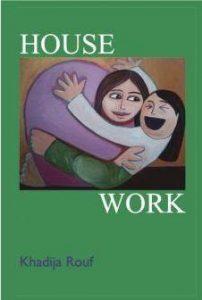Poetry review – HOUSE WORK: Pat Edwards finds honesty and directness in Khadija Rouf’s poems
 House Work
Khadija Rouf
Fair Acre Press
ISBN 978-1-911048-73-2
£7.99
House Work
Khadija Rouf
Fair Acre Press
ISBN 978-1-911048-73-2
£7.99
On opening this book, the reader is immediately struck by sensuous, honest writing about sexual encounters, childbirth and early motherhood. The writing tracks the inevitable changes that ravage body, emotions and the rhythm of daily life:
My body, so bruised by beginnings
– but salvaged – followed its script.
As events take their course, even the home, once a familiar refuge, becomes filled with strangeness, bland domesticity and routine, until it’s time to try to return to work:
We budget for someone to look after our baby,
amidst exploding lists, tallied in-comings, out-goings…
Transaction of love and care, the split inside, the ache,
so I can work, the un-named cost of wanting both
The new mother finds herself ‘stretched between two spheres’: her new role as parent, and the need to be a ‘serious’ returned employee. Talking to her partner becomes a chance to tell ‘stories of our absences’; and all the rooms of the house, all the domestic appliances, take on new significance.
In “The Bins” we find a four-part exposition of the woman’s new life as seen in the different types of household waste that accumulate. She is ‘too late’ with her ‘unused anti-wrinkle face cream’. She tries to ‘plate up love’ but ends up ‘so close to squalor and chaos’. The recycling is ‘abundant and overflowing’, and she smells ‘the heady perfume of decay, hidden under [her] sink’.
Perhaps forced to spend too much time at home thinking, the woman remembers her own parents’ home life which sometimes threatened to break into violence. She compares herself with other women, even those in paintings, and wonders ‘is she still herself inside the house?’ She also asks ‘will she be herself once more, one day?’ Her own home life has its moments of conflict, often over the smallest of things such as the ironing, the cooking, cleaning the toilet, all resolved in bed where the couple finally curl up together. Despite the tension and distractions of family life, the woman remembers that ‘love crackles…like cosmic static’.
The final poem – which, again, is written in four distinct parts – is addressed ‘to my lover.’ We are left to wonder if the woman is remembering how things once were between them when they were young and carefree. “Dance macabre”, brings us full-circle to the sensuous writing of the opening poems. It is emotionally raw and erotic:
Exposed, the ball and socket of your hip joints,
the infinite oval of your pelvis, sciatic,
the place I kissed and watched you rise,
and how you breathed my name,
how I burst with the fingerprints
you left all over me
It’s sad that the poem ends very much in the past tense, ‘how I loved you’, as if such passion is never to be re-lived. And yet, there is a sense that this is simply the realism that pervades the narrative of this pamphlet with its totally honest way of confronting ‘house work’.
Jul 30 2023
London Grip Poetry Review – Khadija Rouf
Poetry review – HOUSE WORK: Pat Edwards finds honesty and directness in Khadija Rouf’s poems
On opening this book, the reader is immediately struck by sensuous, honest writing about sexual encounters, childbirth and early motherhood. The writing tracks the inevitable changes that ravage body, emotions and the rhythm of daily life:
My body, so bruised by beginnings – but salvaged – followed its script.As events take their course, even the home, once a familiar refuge, becomes filled with strangeness, bland domesticity and routine, until it’s time to try to return to work:
The new mother finds herself ‘stretched between two spheres’: her new role as parent, and the need to be a ‘serious’ returned employee. Talking to her partner becomes a chance to tell ‘stories of our absences’; and all the rooms of the house, all the domestic appliances, take on new significance.
In “The Bins” we find a four-part exposition of the woman’s new life as seen in the different types of household waste that accumulate. She is ‘too late’ with her ‘unused anti-wrinkle face cream’. She tries to ‘plate up love’ but ends up ‘so close to squalor and chaos’. The recycling is ‘abundant and overflowing’, and she smells ‘the heady perfume of decay, hidden under [her] sink’.
Perhaps forced to spend too much time at home thinking, the woman remembers her own parents’ home life which sometimes threatened to break into violence. She compares herself with other women, even those in paintings, and wonders ‘is she still herself inside the house?’ She also asks ‘will she be herself once more, one day?’ Her own home life has its moments of conflict, often over the smallest of things such as the ironing, the cooking, cleaning the toilet, all resolved in bed where the couple finally curl up together. Despite the tension and distractions of family life, the woman remembers that ‘love crackles…like cosmic static’.
The final poem – which, again, is written in four distinct parts – is addressed ‘to my lover.’ We are left to wonder if the woman is remembering how things once were between them when they were young and carefree. “Dance macabre”, brings us full-circle to the sensuous writing of the opening poems. It is emotionally raw and erotic:
It’s sad that the poem ends very much in the past tense, ‘how I loved you’, as if such passion is never to be re-lived. And yet, there is a sense that this is simply the realism that pervades the narrative of this pamphlet with its totally honest way of confronting ‘house work’.